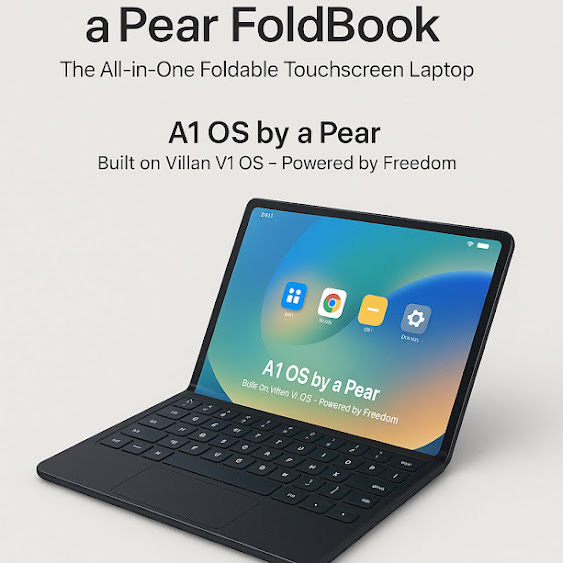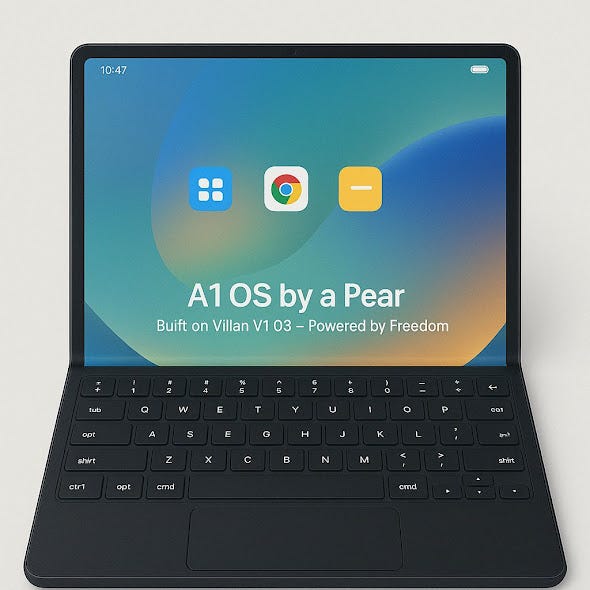FoldBook – The Foldable Future of Computing
The Foldable Frontier: Rethinking Laptops with Modular, Screen-First Design
Introduction
The modern laptop hasn’t fundamentally changed in decades. While thinner bezels, faster chips, and longer battery life have refined its form, the core structure — a static screen hinged to a keyboard — remains the same. But a new class of device is emerging: foldable screen-first laptops that treat the entire surface as an adaptable interface.
Leading this movement is the FoldBook, a device that reimagines computing as modular, contextual, and unified. More than a hardware innovation, the FoldBook is a reaction to the fragmented, inflexible nature of today’s device ecosystems.
What Is a Foldable Laptop — Really?
A foldable laptop is not just a traditional notebook with a bendable screen. It is a redefinition of interaction.
One continuous touchscreen replaces both the display and keyboard
The bottom half of the screen becomes a keyboard, trackpad, game controller, musical instrument, or sketchpad depending on what the user needs
The top half remains the primary visual workspace
Physical keyboards or accessories can be added modularly when needed — but aren’t required
In this model, the computer is no longer a fixed configuration. It becomes a contextual environment that responds to the task, not just a container of applications.
A Case Study: The FoldBook Concept
At the center of this evolution is the FoldBook, a device developed in partnership with modular OS ecosystems such as V1 OS or open systems like A1 OS.
Key Capabilities
Edge-to-edge flexible OLED display with full multitouch
Modular keyboard frame for traditional typing when needed
Built-in SIM slot for mobile calls and data
Wireless sync with wearables (smart glasses, shoes, screens)
V1 OS / A1 OS compatibility for seamless integration across devices
Multi-language soft-keyboard support for global workflows
Use Cases That Go Beyond the Keyboard
The FoldBook isn't just for office work. Its contextual surface unlocks use cases that traditional laptops struggle with:
RoleFoldBook FunctionStudentUse top screen for lecture, bottom for notes or textbookDesignerTop: Canvas, Bottom: Color wheels, brushes, pen inputMusicianTop: Synth controls, Bottom: Touch keys or padsGamerFull-screen display, bottom converts to gamepad or custom controlsRemote WorkerBottom: Video call or notes, Top: Presentation or documentsDeveloperTop: Code, Bottom: Terminal or soft keyboard
The result? A single machine replaces laptops, tablets, sketchpads, and even studio controllers.
Modular Thinking: Hardware, OS, and Experience
Where the FoldBook stands apart is its position in a modular ecosystem.
It’s designed to connect with other devices — smart shoes that track health and movement, glasses that display augmented information, or detachable screens for extended workspace.
It runs on an open OS (like Villan V1 OS) that adapts to device shape and mode.
And most importantly, it's meant to replace multiple devices through context-aware software and a universal surface.
Why It Matters: The Bigger Picture
The FoldBook is part of a broader trend toward fluid hardware and open technology platforms:
Form Follows Use
Instead of adapting your posture or workflow to a rigid device, the device adapts to you.
Decluttering Tech Life
One device that becomes many means fewer gadgets, fewer sync problems, and fewer wasteful upgrades.
Portable but Complete
Unlike tablets with add-ons or ultrabooks with limited touch, the FoldBook is both ultra-portable and fully interactive.
A Path to Inclusive Computing
Multi-language support, touch interfaces, and dynamic layouts make computing more accessible — especially in non-Western or multi-lingual contexts.
Challenges Ahead
While promising, foldable laptops still face hurdles:
Durability of foldable displays remains a concern
Battery life must be optimized for continuous large-screen usage
Typing experience on virtual keyboards may not satisfy all users
Software optimization must catch up to hardware potential
However, many of these challenges are being solved in parallel by advances in battery tech, haptic feedback, and responsive OS design.
Conclusion: A Quiet Computing Revolution
The FoldBook isn't just a shiny new gadget — it’s part of a philosophy shift. From static to adaptive. From hardware-first to software-defined. From cluttered desks to single-surface, multi-mode productivity.
Whether you call it a laptop, tablet, or digital desk — the FoldBook is best understood as an operating surface, not a form factor. It bends, adapts, and connects to your world, not the other way around.
In the age of modular ecosystems and open tech, folding may not just be a gimmick — it might be the most natural way forward.
💻 FoldBook – The Foldable Future of Computing
By Villan – Where Performance Meets Portability in a Seamless Fold
The FoldBook by Villan is a redefinition of the modern laptop: a sleek, foldable touchscreen powerhouse that adapts to your needs in real-time. It's not just a computer — it’s a full workstation, creative canvas, gaming console, and communication hub, all in one continuous screen.
🌀 1 Seamless Fold touchscreen laptop, Infinite Functions
At the heart of FoldBook lies its edge-to-edge foldable display that transforms based on context:
🧠 Top Half: A vivid, high-resolution touchscreen for everything — apps, workspaces, browsing, video, gaming, creative software
✍️ Bottom Half: A contextual interface — switch between a keyboard, trackpad, musical instrument, game controller, or a blank canvas
No hinges, no mechanical keyboards — just digital freedom.
🔧 Tech Highlights:
Runs Villan V1 OS or A1 OS, fully compatible with SmartWearables
Wireless pairing with SmartShoes, SmartGlasses, and SmartScreen
SIM slot for voice calls and mobile internet
Modular external keyboard frame available for traditional use
Multi-language support, instant switching with soft-keyboard modes
Powerful internal hardware (CPU, GPU, storage) optimized for performance and battery life
Optional external smart modular screen + keyboard for extended laptop docking
🧰 How You Use It:
📚 For students: Switch between textbook, notes, and video chat
🎨 For creatives: Draw, produce music, or edit with full-screen tools
💼 For professionals: Portable office with real-time multitasking
🎮 For gamers: Flip to controller mode and play
🎤 For DJs or musicians: FoldBook becomes your instrument or mixer
🧍♀️ For mobile users: Use the FoldBook as your only PC and phone
♻️ Modular. Adaptive. Connected.
FoldBook is part of a larger Villan ecosystem:
Connects to SmartSoles for portable computing
Syncs with SmartScreen or a Pear display devices
Pairs wirelessly with villan wearables for control or display expansion
Optional modular screen & keyboard frames allow you to turn the FoldBook into a traditional laptop format when needed
✨ The Vision Behind FoldBook
We didn’t just want a foldable screen.
We wanted to fold the entire computer experience into one intelligent surface.
Minimalist when you want it. Powerful when you need it.
That’s FoldBook. That’s Villan.
Here is a complete, professional article introducing the Villan FoldBook and Villan V1 OS, blending product innovation, ecosystem philosophy, and technological vision:
Villan FoldBook & V1 OS
A New Era of Modular Computing
In a world saturated with fragmented devices and closed ecosystems, Villan introduces a transformative duo: the Villan FoldBook, a next-generation foldable laptop, and the Villan V1 OS, a unified operating system that redefines the future of intelligent, modular technology.
Together, they signal a new era — one where freedom, functionality, and form coexist in a fully connected digital experience
💻 Villan FoldBook: The Laptop, Reinvented
The Villan FoldBook isn’t just thinner or lighter. It’s smarter. Built around a single, foldable edge-to-edge touchscreen, the device replaces the traditional laptop keyboard and trackpad with an adaptive interface powered by Villan V1 OS.
🖥️ One Screen. Infinite Possibilities.
Top Half: A full-resolution workspace for browsing, video, design, writing, or gaming
Bottom Half: A dynamic interface that becomes a keyboard, drawing pad, game controller, soundboard, or anything else — based on what you're doing
Fold-Friendly Form Factor: A seamless design that folds with durability and elegance
⚙️ Built for Power and Mobility
Embedded high-efficiency CPU & GPU for multitasking, creativity, and gaming
SIM + eSIM support for full mobile independence
USB-C, wireless, and magnetic peripheral support
Optimized for SmartSole, SmartScreen, and Villan AR/VR Glasses
Fast charging + extended battery life
"This is not a laptop upgrade. It's a new kind of personal computer."
🧠 V1 OS: The Core of the Villan Ecosystem
V1 OS is the foundation of Villan’s entire technology philosophy — powering everything from foldables to wearables to smart public infrastructure. Built with freedom, transparency, and modularity at its core, V1 OS allows devices to sync, scale, and serve without locking users into a closed system.
🔑 Key Features
Dynamic UI Environments — Changes based on context: work, art, video, or play
Offline-First Operation — Doesn’t rely on permanent connectivity
Open Platform — Accepts custom apps, interfaces, and hardware
Security by Design — User-controlled privacy, no hidden tracking
Cloud Optional — Local-first data processing, encrypted when online
Cross-Device Sync — Works with Villan SmartShoes, SmartScreens, FoldScreens, AR/VR gear, and more
🌐 Unified, Not Isolated
With FoldBook + V1 OS, Villan introduces a full computing experience where every device speaks the same language — and every user stays in control.
Creators can switch between drawing, editing, composing, or gaming instantly
Students and workers can turn the FoldBook into a notebook, document hub, or video workstation
Developers can build for one system and deploy across multiple form factors
Families and teams can share workflows across screens, shoes, tablets, and glasses
🧩 Modular Tech for a Modular World
Villan’s technology is not about trends — it’s about adaptability, ethics, and user empowerment. The FoldBook reflects Villan’s commitment to:
Utility over hype
Modularity over conformity
Open access over vendor lock-in
"Villan FoldBook is not the future. It's the present, done right."
Conclusion
The FoldBook and V1 OS are not just devices and software — they are pillars of a new digital ecosystem. One that empowers, adapts, and respects the user.
Fold. Connect. Create. Operate.
Legal & Collaboration Notice
The FoldBook — including its foldable touchscreen design, modular keyboard architecture, adaptive interface, screen-first computing layout, and embedded SIM communication system — is an original invention and publication by Ronen Kolton Yehuda (MKR: Messiah King RKY).
This innovation — encompassing the flexible OLED display design, hinge-free folding structure, dual-surface contextual input system, modular frame integration, connectivity protocols, and open OS compatibility (V1 OS / A1 OS) — was first authored and publicly released to establish intellectual ownership and authorship rights.
All associated technical descriptions, software frameworks, mechanical schematics, interface concepts, user experience designs, and product texts are part of the inventor’s intellectual property.
Unauthorized use, reproduction, engineering adaptation, or commercial implementation without written consent is strictly prohibited.
The FoldBook represents a new generation of modular, foldable, and contextual computing, replacing traditional laptop paradigms with a continuous, adaptive surface that serves as both display and input environment.
Through its integration with AI-driven modular ecosystems and connected smart devices (including SmartScreens, SmartSoles, SmartGlasses, and SmartBracelets), the FoldBook extends personal computing into a seamless, flexible, and connected experience.
I welcome ethical collaboration, licensing discussions, academic and industrial partnerships, and investment inquiries for the responsible development and global deployment of this foldable computing innovation.
— Ronen Kolton Yehuda (MKR: Messiah King RKY)
Inventor, Designer, and Author of the FoldBook Concept









